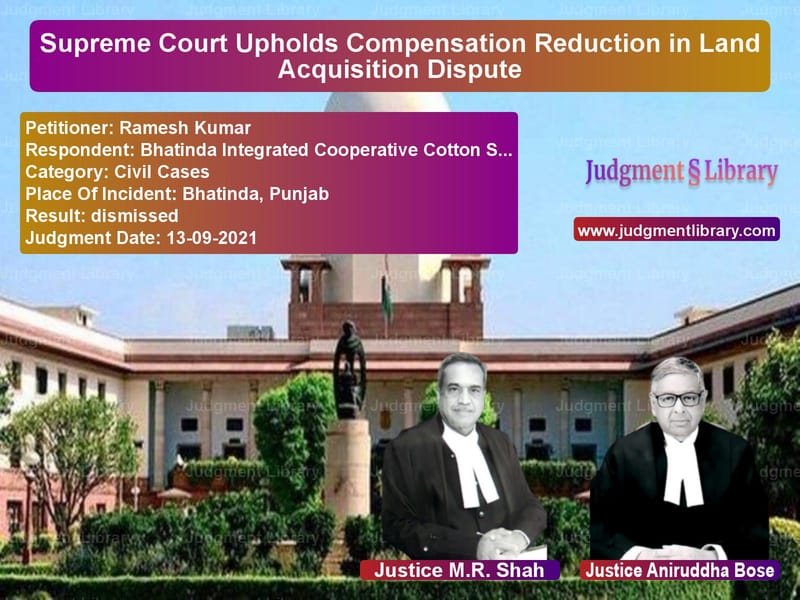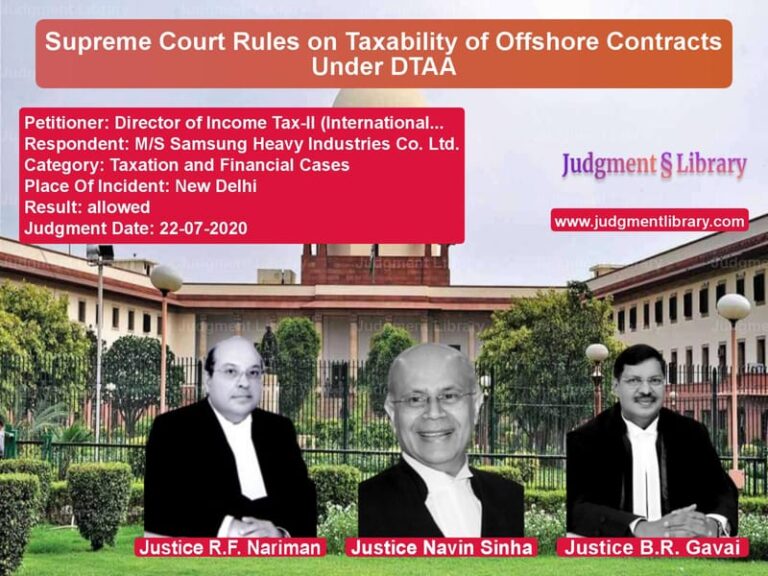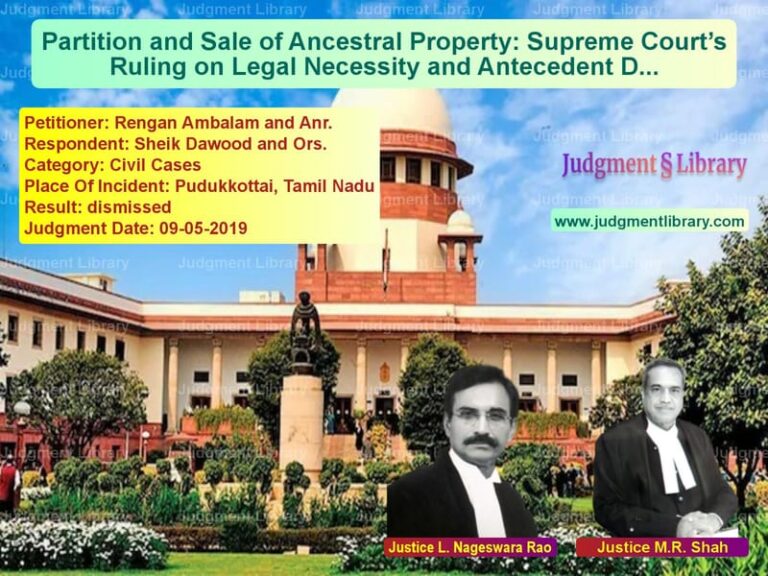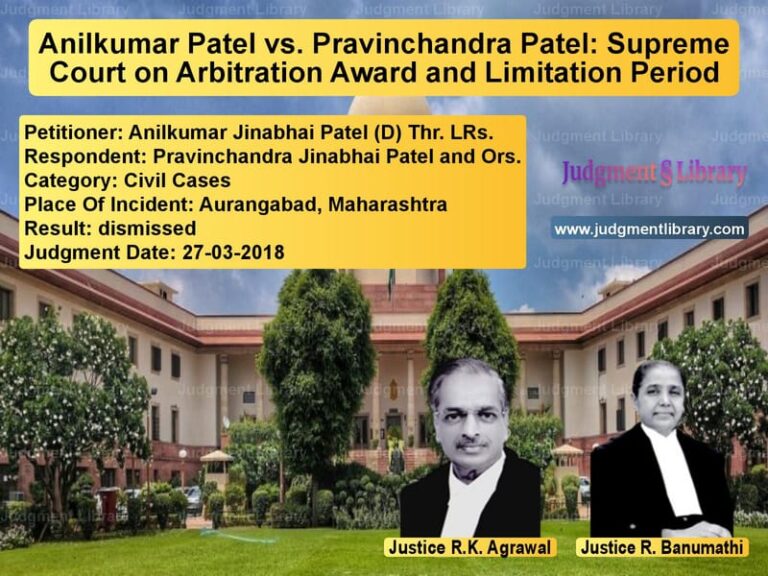Supreme Court Upholds Compensation Reduction in Land Acquisition Dispute
The case at hand involves a significant legal dispute regarding compensation for land acquisition in Punjab. The matter arose from the acquisition of 297 Kanals and 1 Marla of land in the revenue estate of Jassi Pau Wali, District Bhatinda, Punjab, for the establishment of Bhatinda Integrated Cooperative Cotton Spinning and Ginning Mills Ltd. The landowners contested the compensation awarded and sought its enhancement, leading to a prolonged legal battle that reached the Supreme Court of India.
Background of the Case
The notification for land acquisition was issued on June 6, 1988, under Section 4 of the Land Acquisition Act, 1894. The Land Acquisition Officer initially awarded compensation at a rate of Rs. 25,000 per acre through an award dated October 5, 1989. Dissatisfied with the compensation, the landowners sought a reference under Section 18 of the Act. The Reference Court, through a common judgment dated February 27, 1999, determined the market value of the acquired land at Rs. 1,12,000 per acre.
Appeals Before the High Court
Both the landowners and the Spinning Mill challenged the Reference Court’s decision before the Punjab and Haryana High Court. The landowners sought a further enhancement, while the Spinning Mill argued for a reduction in compensation. The High Court, in its impugned judgment, reduced the market value of the acquired land to Rs. 88,400 per acre by imposing a 15% cut towards development costs instead of the 25% applied by the Reference Court.
Arguments of the Landowners
The landowners, represented by their legal counsel, presented several arguments:
- The Reference Court and High Court erred in not considering a sale deed dated May 4, 1981, where land 70 meters away was sold at Rs. 1,17,600 per acre.
- The courts failed to apply the principle established in Mehrawal Khewaji Trust v. State of Punjab, which mandates consideration of the highest exemplar sale deed.
- The High Court wrongly applied a flat 12% annual increase instead of a cumulative increase.
- The deduction for development charges should not have been applied, as the land was semi-urban, located near municipal limits, and had significant potential for commercial and industrial use.
- The land was acquired for a profit-making enterprise, thus, no deduction should have been made.
Arguments of the Respondents
The respondents, including the Liquidator of the Spinning Mill, countered the landowners’ claims, arguing:
- The Spinning Mill was a cooperative society that faced financial losses and was eventually ordered to be wound up.
- The landowners had already received the full compensation as determined by the High Court.
- The case of Rameshbhai Jivanbhai Patel v. ONGC Ltd. was distinguishable, and a standard escalation could not be applied without considering adverse circumstances.
- The militancy in Punjab from 1979 to 1992 had led to stagnation in land prices, justifying a lower escalation rate.
- The sale deed of May 4, 1981, involved a small portion of land and was not comparable to the larger area acquired.
Supreme Court’s Analysis and Judgment
The Supreme Court, comprising Justices M.R. Shah and Aniruddha Bose, thoroughly examined the arguments and precedents. The Court observed:
- The increase in land value should be determined based on prevailing market conditions and should not be applied arbitrarily.
- As per the judgment in Rameshbhai Jivanbhai Patel, escalation should be applied cumulatively for up to 4-5 years; beyond that, it may not be reliable.
- Considering the period of militancy in Punjab, granting a 12% flat increase was unjustified; instead, a maximum 10% annual increase was appropriate.
- The High Court correctly imposed a 15% deduction towards development costs, given that the land was agricultural at the time of acquisition.
- The landowners had already received compensation in full, and reopening the matter was unwarranted.
Based on these findings, the Supreme Court dismissed the appeals, upholding the High Court’s judgment that reduced the compensation to Rs. 88,400 per acre. The ruling reaffirmed the principles governing land acquisition compensation and the necessity of considering economic conditions and practical implications while determining market value.
Petitioner Name: Ramesh Kumar.Respondent Name: Bhatinda Integrated Cooperative Cotton Spinning Mill and Others.Judgment By: Justice M.R. Shah, Justice Aniruddha Bose.Place Of Incident: Bhatinda, Punjab.Judgment Date: 13-09-2021.
Don’t miss out on the full details! Download the complete judgment in PDF format below and gain valuable insights instantly!
Download Judgment: ramesh-kumar-vs-bhatinda-integrated-supreme-court-of-india-judgment-dated-13-09-2021.pdf
Directly Download Judgment: Directly download this Judgment
See all petitions in Property Disputes
See all petitions in Contract Disputes
See all petitions in Damages and Compensation
See all petitions in Judgment by Mukeshkumar Rasikbhai Shah
See all petitions in Judgment by Aniruddha Bose
See all petitions in dismissed
See all petitions in supreme court of India judgments September 2021
See all petitions in 2021 judgments
See all posts in Civil Cases Category
See all allowed petitions in Civil Cases Category
See all Dismissed petitions in Civil Cases Category
See all partially allowed petitions in Civil Cases Category







